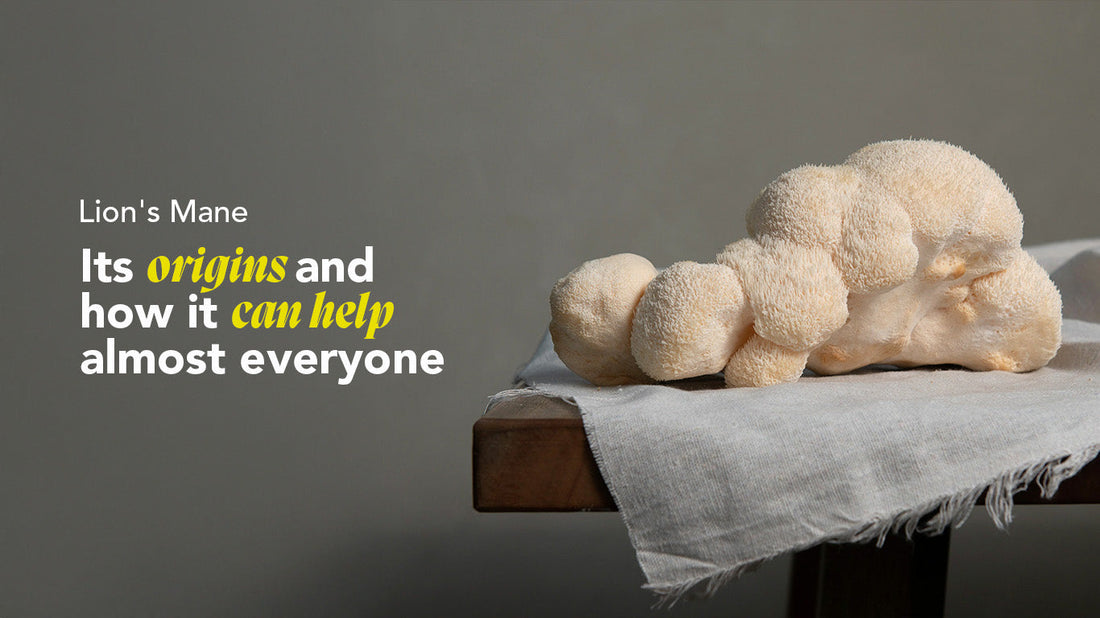History & Origins
Lion’s Mane (Hericium erinaceus) has a rich history in traditional Chinese medicine, where its adaptogenic properties for supporting brain health were first discovered and cherished. Buddhist monks would consume Lion’s Mane tea to increase their ability to concentrate during meditation.
Lion’s Mane has the appearance of the pillowing manes of a lion but is also known as “Pom Pom Blanc”, referring to white cheerleader pompoms. In the Netherlands, it’s sometimes called pruikenzwam.
Like other fungi, the Lion’s Mane mushroom consists of a vast underground network of mycelium that literally helps hold our planet together. Mycelium is a powerful network of hyphae (fungal threads) that can arise from a single mushroom spore.
From this mycelial network, fruiting bodies emerge—the actual mushrooms we recognize. Fungi have an impressive ability to detect nutrients in their surroundings and grow toward them via the most efficient route. In fact, in Japan, a fungus (Physarum) was used to determine the most efficient subway routes in and around Tokyo. This is a fascinating example of how we can harness nature’s intelligence to optimize human infrastructure.
The Lion’s Mane mushroom has existed in China for centuries and, aside from Asia, is found mainly in North America and Northern Europe. Also known as the bearded tooth fungus, it is a weak parasite that targets wounds in the trunks of older beech or other deciduous trees. A single Lion’s Mane fungus can feed on a tree for up to 40 years, with wild specimens reaching a diameter of 25 to 50 centimeters.
Today, most Lion’s Mane mushrooms available for purchase are cultivated. It is crucial that they are grown on logs or sterilized sawdust, in pure air and clean soil conditions. At Nooni, we ensure all our mushrooms are grown in the best conditions. Additionally, we lab test every batch for harmful compounds, as mushrooms can absorb these from their environment, even if a log has been unknowingly exposed to contaminants.
Use Cases
Lion’s Mane is best known for its cognitive benefits. It has a long-standing history of supporting mental clarity, focus, and memory. However, Lion’s Mane is not a "quick fix"—regular use of high-quality extracts is necessary to potentially help with mental fatigue and cognitive decline.
A growing amount of research is being conducted on Lion’s Mane’s effects on neurodegenerative conditions like Parkinson's and Alzheimer's disease. An important factor is the strength of the extract, which typically depends on the extraction ratio and method. At Nooni, we offer some of the highest potency extracts available, boasting a 15:1 extraction ratio. This means we need 15kg of fresh mushrooms to produce just 1kg of extract.
Additionally, we use a dual extraction method, ensuring that the active compounds are effectively extracted using both water and alcohol.
How Does Lion’s Mane Work?
Lion’s Mane contains bioactive compounds called hericenones and erinacines, which stimulate the production of Nerve Growth Factor (NGF). NGF is a protein essential for the growth, maintenance, and survival of neurons—the information messengers of the brain.
Recent Studies
- Studies suggest that Lion's Mane may promote neurogenesis (the growth of new brain cells).
- It may help protect against age-related cognitive decline, including conditions like Alzheimer’s and Parkinson’s.
- More research is needed to fully understand the impact of Lion’s Mane on neurodegenerative diseases.
Common Questions
Is Lion's Mane Safe?
Yes! Lion’s Mane is generally considered safe for most people when used in recommended amounts.
What Is the Recommended Dosage?
Since everyone reacts differently, we recommend starting with 1000mg (1 gram) per day. While some brands promote higher dosages, potency matters just as much. Our 15:1 ratio ensures maximum efficacy. Doses above 1000mg are also considered safe, but 1000mg is an ideal starting point.
How Long Until I See Results?
Since Lion's Mane works by supporting long-term brain health, it may take a few weeks of regular use to notice significant changes in mental clarity and focus. Research indicates that improvements become more noticeable after 8-12 weeks of consistent use.
How Can I Consume It & What Does It Taste Like?
You can consume Lion’s Mane in several ways:
- Raw
- Cooked
- Extracted (like our Nooni Lion’s Mane products)
The taste of raw Lion’s Mane is mildly sweet with a tender texture. Many people enjoy it in teas, coffees, or smoothies for a functional boost.
Why Choose Nooni’s Lion’s Mane?
At Nooni, we are dedicated to offering high-quality, lab-tested Lion’s Mane extracts. With our 15:1 extraction ratio and dual extraction process, we ensure you get the most potent and effective Lion’s Mane supplement available.
Final Thoughts
Lion’s Mane is a remarkable nootropic mushroom with a long history of supporting brain health, focus, and mental clarity. Whether you want to enhance cognitive function or support long-term brain health, Nooni’s premium-quality extracts provide the ideal solution.

